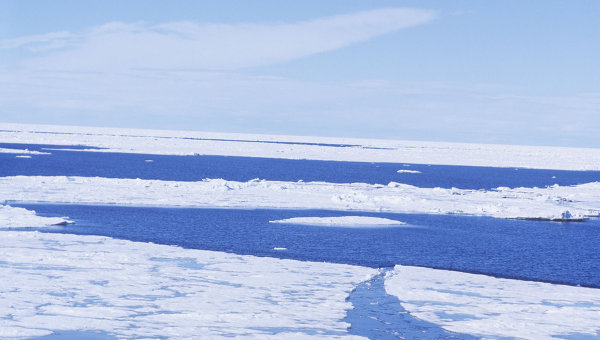
Russian Strategic Interests Expand In the Arctic
Publication: Eurasia Daily Monitor Volume: 8 Issue: 173
By:

Russian Prime Minister Vladimir Putin has been the chief proponent of Arctic development among the Russian elite, and he continues to be its booster. Putin promotes the creation of infrastructure so that Russia can exploit the Arctic’s energy resources as he emphasizes the need to protect that wealth from other powers. Under Putin, energy policy has been part of the commanding heights of the economy, the success of which will guarantee Russia’s future position in the twenty first century. Two of the major actors in Russia’s energy sector are state-controlled giants, Gazprom and Rosneft. Skeptics of Putin’s plans for the Arctic often focus on the lack of expertise of these Russian firms to undertake the sophisticated deep-drilling operations in the Arctic environment. Russia recently took a major step toward making these plans a reality. On August 30, Putin reported the conclusion of a major deal between Rosneft and ExxonMobil for Arctic energy development. According to Putin, “New horizons are opening” (www.gazeta.ru, August 20).
The strategic partnership will open the way for ExxonMobil to participate in the development of Russia’s Arctic Shelf and allow Rosneft to cooperate with ExxonMobil in the Gulf of Mexico. Putin explained: “The event will be greeted positively by world markets . . . because it opens new horizons –the work of one of the leading world companies, which is ExxonMobil, in the Russian Arctic and the deep shelf.” Putin estimated the direct investments by the two parties at between $200 billion and $300 billion in the construction of the necessary infrastructure. Putin also noted that the deal would include the possibility of Rosneft cooperating with ExxonMobil in fields in the Gulf of Mexico, Texas and other parts of the world (www.gazeta.ru, August 20).
One day later, speaking to a conference devoted to the development of an infrastructure to enhance the Russian Federal Border Guard Service, Putin stated that the government intended to make a major investment in this area: “Over the next nine years it is planned to channel 134 billion rubles ($4.27 billion) into the provision of state border facilities for the creation of the infrastructure, as we agreed yesterday with the vice premier in charge of this area and with the finance ministry.” This investment is in addition to 110 billion rubles ($3.51 billion) spent on the same task since 2003. Putin pledged that 40 billion rubles ($1.27 billion) would be invested by the end of this fiscal year. This investment translates into additional border posts. With regard to Russia’s north, Putin declared: “The Arctic will be shut behind a locked border.” Vladimir Putin wants Russians to understand that the Arctic must be treated as a strategic region vital to Russia’s future development. Putin asserted: “Special attention must be devoted to the creation of a modern border infrastructure in the Arctic zone. This will make it possible substantially to strengthen our military and border security and also to increase the effectiveness of the protection of natural resources” (Nezavisimaya Gazeta, August 31).
The day after Rosneft’s President Eduard Khudainatov and the head of ExxonMobil Development, Neil W. Duffin, signed a strategic cooperation agreement in Sochi in Putin’s presence and the same day the prime minister was speaking about protecting Russia’s Arctic frontiers, Russian court officers raided the Moscow offices of BP in response to a suit by BP’s Russian partner TNK-BP. The suit accused BP officials of ignoring its Russian partnership with TNK-BP, and concluding another strategic partnership agreement in January 2011 with Rosneft. The $16 billion deal fell apart when TNK-BP minority shareholders led by Aleksandr Prokhorov filed a law suit against BP Russia over the exclusion of TNK-BP from the Arctic partnership with Rosneft. BP said the raid on its office was without legal foundation. Jeremy Huck, president of BP Russia, estimated that about 20 persons were present in the company’s offices and that these persons included representatives of Prokhorov. The court order authorizing the search stipulates that Prokhorov’s representatives have unlimited access to any information found (The Moscow Times, September 1).
BP’s problems began in January 2011, when it sought that deal with Rosneft to gain access to Arctic exploration and bypass its existing partner TNK-BP, which was a joint venture between BP and AAR Consortium, composed of Alpha Group, Access Industries and the Group of Companies “Renova.” Behind AAR Consortium were the Russian billionaires, Mikhail Fridman, Viktor Vekselberg, German Khan and Leonard Blavatnik. They objected to the move. BP attempted to organize a buyout of AAR’s interests in TNK-BP and failed. BP was just recovering from the damage done to its global corporate image by the major oil spill from its drilling platform in the Gulf of Mexico and looked to the deal with Rosneft as a key move into Arctic exploration. Rosneft had rejected a deal with TNK-BP because it could not offer any expertise in Arctic drilling (Vedomosti, February 1).
An inside look at BP’s strategy can be seen in a WikiLeaks transcript of a conversation in November 2010 between David Peattie, BP’s Group Vice President for Russia and Kazakhstan and its representative in TNK-BP management and Ambassador John R. Beyrle. Peattie stated that BP was in Russia for the long term but was reassessing its “troubled partnership with TNK-BP” and stated: “BP would not be surprised to see the company split up and taken over by Gazprom and Rosneft within two years.” If one expected the state-owned Rosneft and Gazprom to swallow TNK-BP in the future, it made no sense to support its interests (www.guardian.co.uk, January 18). However, the negotiations on the deal between BP and TNK-BP dragged on and finally failed. Meanwhile, BP came under more and more pressure from the Russian authorities, making it difficult to do business in Russia. Rumors in business circles were speculating about Rosneft seeking another partner for its Arctic explorations, including Royal Dutch Shell and Chevron. But the final deal was with ExxonMobil.
The euphoria in Moscow over the deal between Rosneft and ExxonMobil hardly had time to die down when commentators began to raise questions about it. On September 2, Michael Bohm raised several obstacles facing the successful execution of the project. Recalling the sordid history of the Rosneft-BP deal in January of this year, Bohm suggested: “Exxon, do not pop the champagne open yet.” He called attention to likely opposition to the deal in the US Congress and cited the case of such opposition torpedoing a deal between China’s state oil company from acquiring Unocal in 2005. Bohm assumes that the Obama administration would support such a move as part of giving an economic dimension to its “reset” policy. But in an election year, a Republican Congress could use the deal to attack an economic reset. The more serious problem Bohm sees is in what he calls “Russia’s unpredictable business environment.” By this he means that negotiated and signed deals tend in Russia to be followed by more negotiations or by arbitrary state actions that transform the playing field. Citing several examples of such radical developments, Bohm suggests that ExxonMobil’s leadership should recall the situation in mid-October 2003 when “then Exxon CEO Lee Raymond and Yukos CEO Mikhail Khodorkovsky were just about to sign a deal in which the US giant would buy 40 percent of YukosSibneft. Then, two weeks later on October 25, Khodorkovsky was arrested on fraud and tax evasion charges” (The Moscow Times, September 2).
On September 5, the Russian press picked up an article from the Financial Times, in which Courtney Weaver discussed reports of possible insider trading in association with the Rosneft-ExxonMobil deal. She reported that Russia’s market regulators had just launched an investigation because shares of Rosneft’s stock went up by 12.5 percent three days before the deal was announced. Weaver notes that efforts to prevent insider trading in Russia are new and that the track record on such insider deals is not encouraging. Recent legislation to address the problem has increased bureaucracy but not curtailed the activity. Weaver reports that “one investor is said to have purchased 1 million shares in the company at an average price of 210 rubles per share, allowing the investor to have made a profit of 19.7 million rubles ($629,000) on the deal, if they sold at Monday’s price of 229.7 rubles per share” (InoPressa, September 6).
One has to wonder whether BP’s leadership had read the work of another Aleksandr Prokhorov, the Yaroslavl University professor and consultant with the Skolkovo Moscow School of Management, on “The Russian Management Model: Hidden Reflections.” Prokhorov comments on the inefficiency of Russian management and its ability to achieve results by unorthodox means and on the tendency to see law as an obstacle to be circumvented and not obeyed. (Aleksandr Prokhorov, Russkaia model’ upravleniya, Moscow: Izdatel’stvo ZAO “Zhurnal Ekspert,” 2002). Perhaps ExxonMobil should also order a copy as it moves into its strategic partnership with Rosneft.




